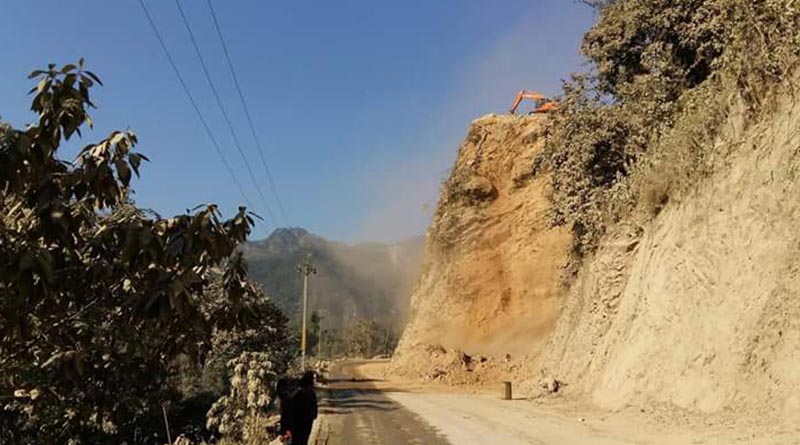Bio-engineering along Narayangadh-Muglin to prevent landslide
CHITWAN: Bio-engineering techniques have been introduced to stabilise slopes and prevent soil erosion and landslides along the Narayangadh-Muglin road section.
The use of bio-engineering techniques has been launched to contain the perennial problem of landslides blocking the movement of vehicles, said Janak Raj Pathak, Environmentalist at the Narayangadh-Muglin Road Project.
Due to the ongoing road expansion project on the road stretch, minor as well as massive landslides are the daily routine in the Narayangadh- Muglin road section. While widening the road section, the cutting of side of hills, cliffs, slopes and rocks has created problems as the landslides and debris falling occur, subsquently halting the movement of vehicles.
According to Pathk, jute netting, fascine, bamboo fencing, silt fencing, stone riprap, grass plantation, brush layering etc are the techniques used for controlling the landslides, soil erosion and stabilising slopes on the area.
“Though the bio-engineering techniques do not produce immediate results, they show the effectiveness in the long term”, said Pathak, adding the use of bio-engineering techniques have been sped up on the road section, which is the major road connecting Kathmandu with the plain Terai .
A total of 49 per cent of the road stretch where road upgrading have been completed, has been fitted with the bio-engineering methods to contain the debris falling and landslips.
The use of bio-engineering techniques has been complete on the Ramnagar- Bhateri road stretch and is being carried out on Ramnagar- Aanptari and Dasdhunga road section. Likewise this has also been applied where slopes have been cut and walls been constructed.
According to Engineer Shiva Khanal at the Road Project, the use of bio-engineering techniques is very effective in protecting soil and stabilising slopes, however, it takes three years for the effectiveness to be realised.
The use of flora with structural designs to control landslides, debris falling is called bioengineering. The easily available local species of vegetation are used in the techniques.
Nearly 10 thousand vehicles ply on the road daily and tens of thousands of passengers commute through this road. When the road is closed for only an hour, the economic loss is huge.






